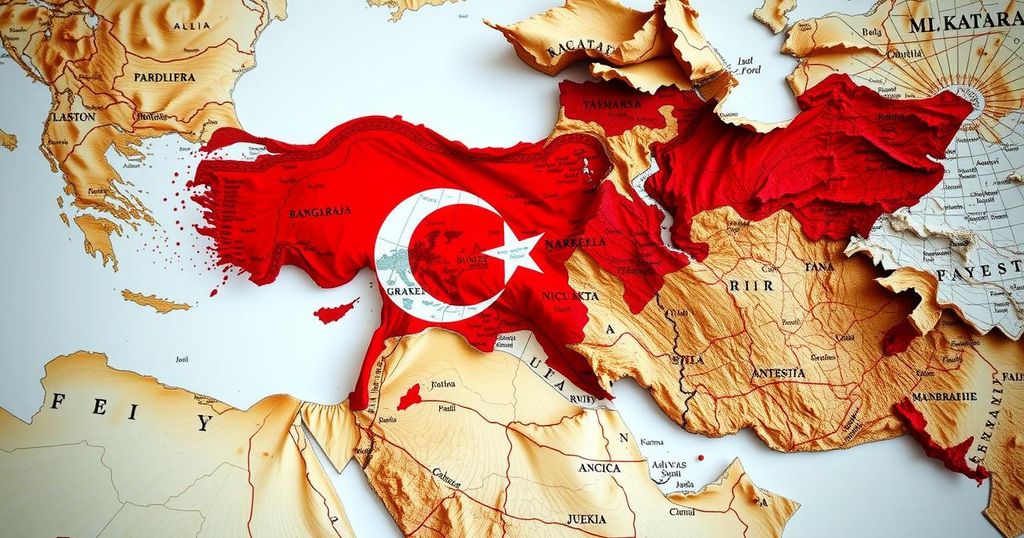Global news
ASIA, ASSAD, BASHAR AL - ASSAD, DID, ERDOGAN, EUROPE, EUROPE/ASIA, EUROPEAN UNION, FIGHTER JETS, FOREIGN POLICY, FRANCE, KURDISTAN WORKERS ' PARTY, MANBIJ, MILITARY ACTIONS, NORTH AMERICA, PKK, REC, SYRIA, SYRIAN CIVIL WAR, SYRIAN CONFLICT, SYRIAN DEMOCRATIC FORCES, TURKEY, UNITED STATES, WAR
Leila Ramsay
0 Comments
The Fall of Bashar al-Assad: Turkey’s Strategic Ascendancy in the Region
The toppling of Assad has enabled Turkey to enhance its regional influence significantly while presenting challenges for President Erdogan. Amid the chaos in Syria, Turkey seeks to secure its border against Kurdish threats and manage a large population of Syrian refugees. Erdogan’s strategies and the responses of a new Syrian government will shape the future landscape of the conflict and regional dynamics.
The recent ousting of Syrian President Bashar al-Assad has significant implications for Turkey’s strategic influence in the region, particularly under the leadership of President Recep Tayyip Erdogan. Assad’s refusal to collaborate with Erdogan has resulted in a loss of power for the Syrian leader and the emergence of Turkey as a major regional player. Turkey’s actions, including backing Islamist rebel groups, highlight its vested interest in the stability of Syria and its efforts to ensure security along its border. Furthermore, Turkey seeks to mitigate threats from Kurdish groups whom it associates with terrorism.
As Turkey continues to grapple with a large influx of Syrian refugees and their political ramifications, Erdogan appears determined to facilitate a return of these individuals to Syria, although many refugees harbor doubts about returning amid ongoing instability. The situation remains fluid as Turkey exerts its influence over northern Syria and engages with various factions, including the Syrian National Army and Hayat Tahrir al-Sham. The outcome of these efforts will significantly rely on the orientation of Syria’s new leadership in the wake of Assad’s removal and how it chooses to approach Kurdish representation within its governance structure.
The Russian influence in Syria is also at a crossroads, particularly concerning Turkey’s involvement. Erdogan has attempted to reconcile with Assad, aided by Russian support, but Assad’s prior disregard for these overtures may complicate future relations. Observers speculate about whether the new Syrian government will maintain a semblance of cooperation with Russia or choose to reevaluate its alliances moving forward.
As Turkey maneuvers in this transformed landscape, many analysts conclude that it is emerging as a regional victor, strategically reinforcing its position against threats and increasing its geopolitical relevance in Middle Eastern affairs. This rapid shift prompts questions regarding future governance in Syria and the potential for factionalism among ethnic and political groups in the absence of firm leadership.
The conflict in Syria has been marked by prolonged instability, primarily as multiple factions vie for control in the absence of central authority. Since the uprising against Bashar al-Assad began, Turkey has played an increasingly influential role, supporting various rebel factions while simultaneously managing its own national security concerns, particularly regarding Kurdish groups. The dynamics are further complicated by the presence of Syrian refugees in Turkey and the geopolitical interests of external powers like Russia. The recent developments surrounding Assad’s overthrow offer insights into the shifting power balance within the region and Turkey’s strategic objectives.
In conclusion, the fall of Bashar al-Assad has paved the way for Turkey to solidify its influence in northern Syria. Erdogan’s administration is keen to curb Kurdish autonomy and facilitate the return of Syrian refugees, positioning Turkey as a pivotal player amid the region’s complex geopolitical landscape. The implications of this transition remain uncertain, particularly as the new Syrian government’s stance towards Turkey and Kurdish representation will likely dictate future developments. Turkey’s actions thus far underscore its significant role in shaping the future of the region, heralding both opportunities and challenges ahead.
Original Source: www.france24.com




Post Comment